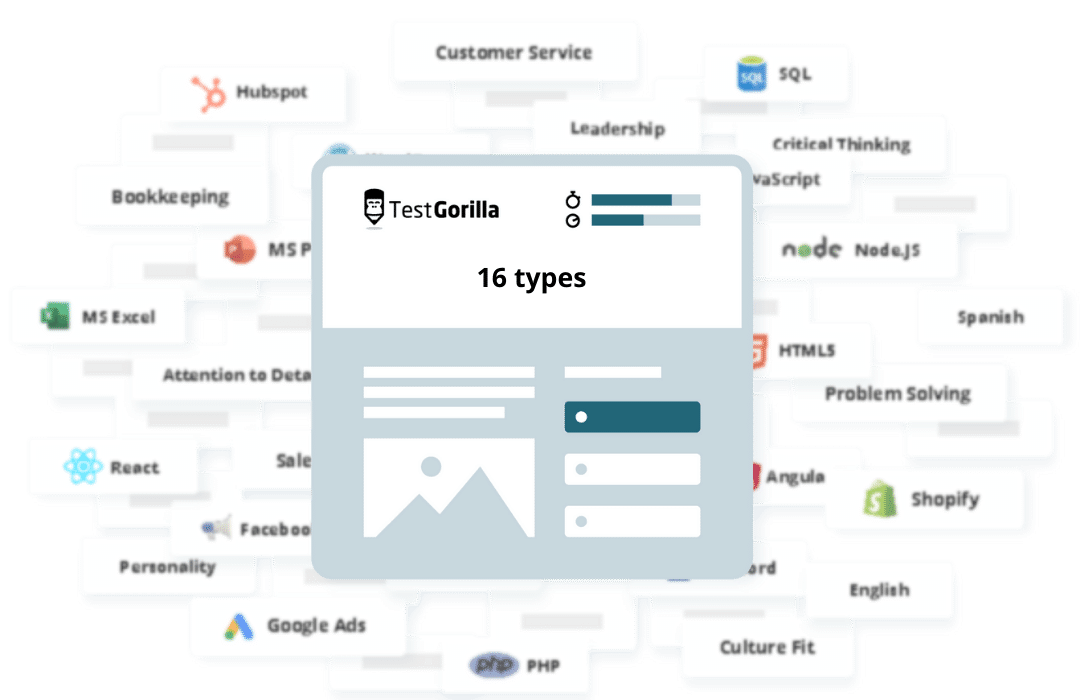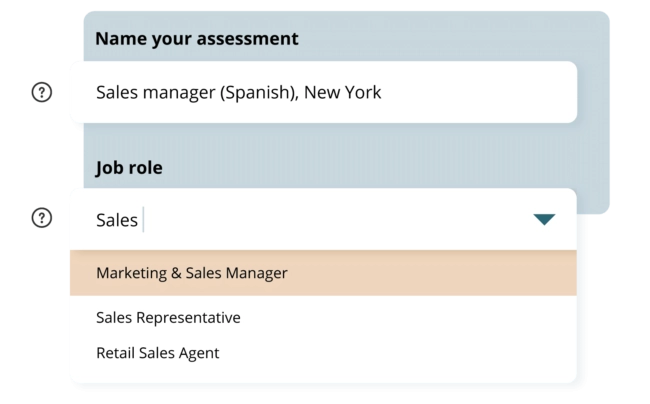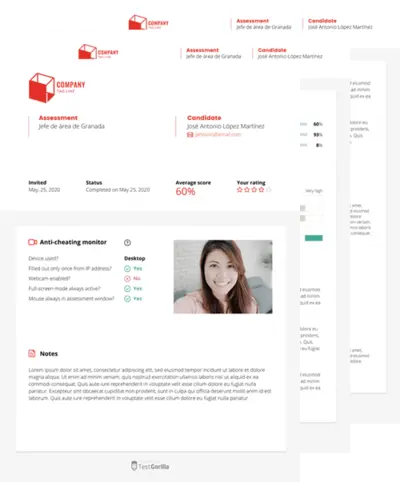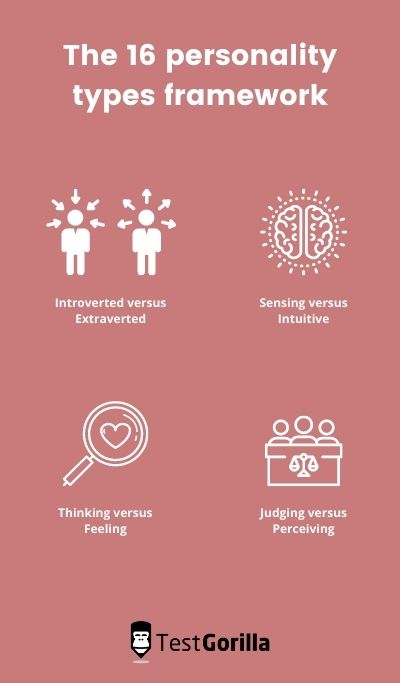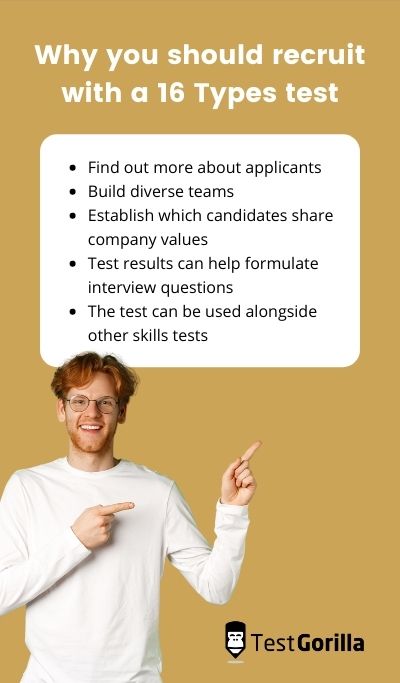16 personalities test: Online screening assessment to hire top candidates
Summary of the 16 types test
The 16-type personality test is based on the work of Carl Jung. This personality test gives insight into a candidate’s source of energy, the way they process information, how they make decisions, and the kind of lifestyle they prefer.
The 16 personalities test is designed by a subject matter expert to understand candidates’ preferences, personality traits, and how they navigate issues and opportunities. You can send this online personality test to your prospective job applicants before inviting them to an interview. With data-driven results, now you can hire quality candidates with the right personality type for all your job roles.
Use the 16 types test to hire
The 16-personalities test can be used for all job roles. The results of the test should not be used for evaluative purposes, but as a way to get to know the candidate better and obtain talking points for an interview.
Type
Time
Languages
Level
About the 16 types test
The choices we make in specific situations reveal how we perceive and interpret the world. They can show our likes and dislikes, aspirations and fears, or abilities and challenges. Understanding someone’s preferences can give deeper insight into their personality and traits and how they navigate issues and opportunities.
The 16 types test is an introspective, self-evaluation questionnaire that asks candidates to consider their preferences under various circumstances. The test leads candidates to explore their choices on four different dimensions given as spectrums: introversion versus extraversion, intuition versus sensing, feeling versus thinking, and judging versus perceiving.
Depending on their answers, candidates will show a preference for one side of each spectrum over the other. The results are given by combining the first letter of each preference into a four-letter personality type to derive to one of the 16 possible types, such as eNfp or isTj, for example. The capital letters represent a preference that is particularly strong in each candidate’s individual results.
The results page of each questionnaire offers a detailed description of the candidate’s personality type. It provides tips to both the candidate and their prospective colleagues on different personality types on the best ways to work effectively together.
The test is made by a subject-matter expert
Sergei M.
Sergei is a Licensed Psychotherapist (Canada). He applies his deep interest in personality psychology in a business setting to achieve optimal personality-role, personality-group, and group-culture fit. Having managed diverse teams of 20 to 70 employees, Sergei considers personality psychology indispensable for the modern manager. Sergei’s other interests include travel, chess, and cognitive-behavioral psychology.
Crafted with expert knowledge
TestGorilla’s tests are created by subject matter experts. We assess potential subject-matter experts based on their knowledge, ability, and reputation. Before being published, each test is peer-reviewed by another expert, then calibrated using hundreds of test takers with relevant experience in the subject. Our feedback mechanisms and unique algorithms allow our subject-matter experts to constantly improve their tests.
What our customers are saying
TestGorilla helps me to assess engineers rapidly. Creating assessments for different positions is easy due to pre-existing templates. You can create an assessment in less than 2 minutes. The interface is intuitive and it’s easy to visualize results per assessment.
David Felipe C.
VP of Engineering, Mid-Market (51-1000 emp.)

Any tool can have functions—bells and whistles. Not every tool comes armed with staff passionate about making the user experience positive.
The TestGorilla team only offers useful insights to user challenges, they engage in conversation.
For instance, I recently asked a question about a Python test I intended to implement. Instead of receiving “oh, that test would work perfectly for your solution,” or, “at this time we’re thinking about implementing a solution that may or may not…” I received a direct and straightforward answer with additional thoughts to help shape the solution.
I hope that TestGorilla realizes the value proposition in their work is not only the platform but the type of support that’s provided.
For a bit of context—I am a diversity recruiter trying to create a platform that removes bias from the hiring process and encourages the discovery of new and unseen talent.
David B.
Chief Talent Connector, Small-Business (50 or fewer emp.)

Use TestGorilla to hire the best faster, easier and bias-free
Our screening tests identify the best candidates and make your hiring decisions faster, easier, and bias-free.
Watch what TestGorilla can do for you
Create high-quality assessments, fast
Building assessments is a breeze with TestGorilla. Get started with these simple steps.
View a sample report
The 16 types test will be included in a PDF report along with the other tests from your assessment. You can easily download and share this report with colleagues and candidates.
16 personalities test: Its importance in the workplace
As humans, we all have different personalities. Our personalities influence how we work, manage situations and make decisions. Therefore, personality typology has become a popular tool to build diverse teams and determine how candidates will perform in the workplace.
Personality typology tests like the 16 Types test can help recruiters build effective teams that communicate well and understand each other.
But what are personality types and how does the 16 Types test work in the recruiting process? Let’s take a look.
The 16 personality types
The Swiss philosopher Carl Jung theorized that people experience and navigate the world through four different psychological functions. Jung noted that humans have complex psychologies and that there could never be a pure type of any single function. Therefore, he created a framework that can be used to understand individual personalities.
• Introverted versus Extraverted: How individuals respond and interact socially.
• Sensing versus Intuitive: How people approach information and situations and interact with the world.
• Thinking versus Feeling: How they manage emotions and make decisions.
• Judging versus Perceiving: How people plan and navigate tasks.
Everyone’s personality contains one of the two options in each of the framework’s four categories, so 16 personality types can be derived from it. This means that every individual’s personality is made up of either the first or the second item in each of the four categories.
What are the 16 personality types?
The 16 personality types can tell you about a candidate’s personality and give you insights into how they might fit into your team. The personality types are broken down as follows:
Extraverted Intuitive Thinking Judging (ENTJ): Applicants with ENTJ personality types are natural leaders who can be determined employees. Candidates with this personality type are quick to delegate tasks and motivate their team.
Extraverted Intuitive Thinking Perceiving (ENTP): Smart and insightful people often have an ENTP personality type. Candidates in this group are optimistic, thoughtful, and good at building relationships with team members.
Extraverted Intuitive Feeling Judging (ENFJ): Candidates with ENFJ personality types are known for being lifelong learners. They support and include others and are eager to help their co-workers when required.
Extraverted Intuitive Feeling Perceiving (ENFP): If any of your applicants are in this personality type group, they may have exceptional skills in coming up with ideas and solving problems. They are good team players and work well in groups.
Extraverted Sensing Thinking Judging (ESTJ): Applicants with ESTJ personality types work well in organized teams. They have a strong work ethic and therefore put a lot of effort into their tasks.
Extraverted Sensing Thinking Perceiving (ESTP): Candidates who have the ESTP personality type rely on facts to make decisions. In the workplace, they work hard but will keep innovating on processes to streamline their tasks.
Extraverted Sensing Feeling Judging (ESFJ): Task delegation and problem-solving are synonymous with candidates in the ESFJ group. People with this personality type like taking the lead and creating structure in the workplace.
Extraverted Sensing Feeling Perceiving (ESFP): Applicants with an ESFP personality type are extroverts and known for being outgoing and social. Although they enjoy the limelight, they are good at building bonds and sharing knowledge.
Introverted Sensing Thinking Judging (INTJ): Individuals who are good at planning, putting strategies in place, and taking on tasks step-by-step are often INTJ personality types. Candidates in this group can prefer to work independently from others.
Introverted Intuitive Thinking Perceiving (INTP): People with INTP personality types are known for being intelligent and creative. If your candidates have INTP personality types, they are likely to support their teams and help to find solutions.
Introverted Intuitive Feeling Judging (INFJ): If some of the applicants for your role are INFJ personality types, they may prefer working independently. They prefer quieter work environments, and they are creative, imaginative, and insightful.
Introverted Intuitive Feeling Perceiving (INFP): Characterized by their creativity and communication skills, people with the INFP personality type are enthusiastic about their work, known to bring positive change, and thoughtful in their approaches to tasks.
Introverted Sensing Thinking Judging (ISTJ): Candidates in this group are reliable, hard-working, and consistent in their work. They work best in structured environments and are known for taking responsibility for any tasks assigned to them.
Introverted Sensing Thinking Perceiving (ISTP): Applicants who are ISTP personality types are good at breaking down, analyzing, and correcting complex problems. They often prefer quiet surroundings, but work well in teams in times of need.
Introverted Sensing Feeling Judging (ISFJ): Candidates with ISFJ personality types are known to deliver high-quality work. They are loyal and reliable in the workplace, and will consequently take on tasks rather than delegate them.
Introverted Sensing Feeling Perceiving (ISFP): Despite being introverts and enjoying working by themselves, people with ISFP personality types enjoy working in teams. They thrive on learning and skills development and excel in changing environments.
Recruiting with a 16 personalities test
When recruiting, the 16 personality types are a good way to find out more about applicants and build diverse teams. A simple way to acquire these insights is to use a 16 Types test.
TestGorilla’s 16 Types test asks applicants to reflect on various examples using a self-evaluation questionnaire. The test lets them explore their choices on the four spectrums: introversion versus extraversion, intuition versus sensing, feeling versus thinking and judging versus perceiving.
The test is best used at the beginning of the recruitment process, to help you formulate the best interview questions for each candidate. But a 16 Types test can also be accompanied by role-specific skills tests to create a comprehensive assessment for the position you are recruiting for.
In addition, TestGorilla’s pre-employment screening tests help you identify the top candidates for the job, eliminating the need for CVs and streamlining the recruitment process.
In summary
Although personality assessments remain a popular choice for recruiters, a 16 Types test accompanied by technical skills tests can help you gain a deeper insight into applicants. With TestGorilla, you can find out more about candidates in relation to both hard and soft skills, before deciding on the top talent to invite to the interview phase.
FAQs
Related tests
Culture add
Motivation
DISC
Big 5 (OCEAN)
Enneagram
HEXACO Personality test: Coming soon

